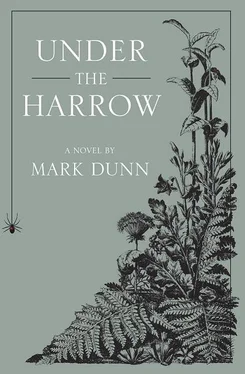heart. Do not shrink, my darling child. Suffer Frederick to take this matter to the sheriff and give that good man leave to place it into the hands of the law.”
“The Sheriff will not think me insane?”
“He’s known you all your life, Hannah,” I replied.
A moment passed, and then another. Finally, Hannah signaled her consent with a nod.
“The lid is off the kettle and the heat below is coming to full flame,” Mrs. Lumbey continued by way of summary, “and things will reach a boil, whether one wishes them to or no.”
“I have opened a veritable Pandora’s box, haven’t I?” rejoined Hannah with a quivering lip. “And nobody can undo what has been done here.”
“However, I wouldn’t put it in those terms,” said I. “It was never your parcel, but something your father has secreted that is at issue. Forgive me for speaking ill of the man whose blood you carry in your own veins, Hannah, but I don’t like the sound and substance of anything you’ve told us this morning. It must be investigated. Have I your permission to go directly to the sheriff with that which I now know?”
“Directly?” The word gave her long pause. Hannah was torn and tormented by her predicament. There was no safe path — each possible avenue being strewn with nettles and pocked with holes to sprain and trip and perhaps cripple the farer along the way. But one takes a journey through a series of single steps. And this first step put the foot upon solid ground.
“Very well,” said she in a soft, even strain. “I suppose you must.” Mrs. Lumbey and I greeted Hannah’s decision with a reception of nods and compassionating smiles.
“You are much too lovely a girl to have to reside with lunatics,” appended Mrs. Lumbey on her way to the stove to reheat the kettle. “And we simply cannot have that !”
Chapter the Twenty-fourth. Monday, June 30, 2003
 untle scratched his head. He coughed. He composed his features and then he said, “It is all quite unbelievable.”
untle scratched his head. He coughed. He composed his features and then he said, “It is all quite unbelievable.”
The two of us were strolling along Rudge Street in Milltown, my having joined him on afternoon rounds. It was generally the duty of the deputy or, in exceptional circumstances, the tipstaff (or vice-sheriff) to watch the streets for things amiss, but on this particular Monday post-noon hardly a deputy was eligible for patrol, nearly all of the young lawmen having gone to the cricket field. The game, which had been initiated at Regents Park the previous afternoon between the Sheriff ’s League and the Barbers’ Brigade (an historic rival), remained tied when suspended on account of darkness and had this following day been resumed to determine which team would face the Hustling Hostlers in the tournament’s final match on the following Sunday. The sheriff himself was eager to complete his rounds and be off to extend befitting motivational encomiums to his bowler and his fielders, but he also knew that there was plenty of time for him to demonstrate his support, this particular bout conceivably lasting another five or six hours.
“Do you mean, Muntle, ‘unbelievable’ in the sense of ‘preposterous!’ or is your meaning something more along the lines of ‘I stand here amazed but won’t deny what you’ve told me’?”
“The latter of course. Have I any reason to doubt what you’ve just said?”
“None whatsoever. So you’ll come with me, then, to see it for yourself?”
Muntle thought over the proposition but didn’t speak.
I pursued: “It won’t take you much out of your way, and you’ll view with your own eyes what Hannah Pupker’s eyes have beheld, much to her detriment.”
Sheriff Muntle, having stopt at the corner of Rudge and Dorrit, cleared his throat to make his response, as, at that instant, a young boy whose name I recalled as either Tom or Toby approached us with broom in hand to sweep the equine and bovine ordure off the cobbled lane in anticipation of our desire to cross without soiling our boots.
“We will not cross here,” said Muntle to the child, “but are only suspending our perambulation for a brief interval. Nonetheless, here are three mil to thank you for your interest in our well being.” Muntle dropt the tiny coins into the young boy’s small, outstretched hand. Tom (or Toby) pocketed his gain with a smile and then tipped his frayed cap before turning to accost the couple (the glazier and his wife, the miniature painter) who casually strolled a few paces behind us.
The youthful crossing sweeper was amongst the poorest of the valley, nearly as indigent a child as any within the barefoot Scadger clan. Mind, no child starved in Dingley Dell who could open his mouth to take thin, eleemosynary gruel into his empty maw (and publicly-bestowed brimstone and treacle for the constitution was given, as well, by the charity ladies — or charity “ladlers” as they were more humorously denominated), but a good many of our younger Dinglians (and quite a few of the older ones as well) had little to their name beyond the bread that they received at the workhouse and the various dispensaries of beneficence, or those crusts earned by the sweat of their own brows or the exhausting enterprise of an eking parent.
Dingley Dell, in spite of every good effort to turn it to utopia, endured a system of class and caste, which closely paralleled that with which we had become quite familiar through the works of Mr. D. and the authors of the Ensyke . The system was put into place quite early in the long epoch of our existence, born of the greed and sharp wits of a group of First Generationers who saw fit to seise the larger farms and estates subsequent to their adult evacuation and then to hold them within their families in virtual perpetuity, not unlike the unapologetic aim and purpose of the landed gentry of Queen Victoria’s realm. It was vexing to everybody whose ancestors had not the expeditious wherewithal to do the same, but each of those generations that came thereafter settled, at all events, into an attitude of acquiescence (of a sort) to their fated lot, such resignation amongst the “have lesses” discouraging the fomenting of revolt or any concerted movement toward republicanism, so long as one was permitted to pursue the vocation of one’s calling, or, in the case of the poor, under-skilled and dimwitted, to receive their roll with butter (or lardy butterine) and the occasional tumbler of mitigating ale.
I, like Muntle, carried mils about in my pocket to bestow upon the poor with daily munificence. There was not much that a mil could buy, but ten would give a cent, and ten cents a florin, and before one knew it, a man (or boy) might find a pound’s worth of the small-valued coins within his pocket, and a pound would buy a great deal in our small mercantile world in which there was not much to buy of great worth, but a great store of available goods of significantly lesser value.
“What are you getting at, Trimmers? That we should go at this very moment and pray access to this sub-cellar that Hannah Pupker limns? And upon what grounds would I compromise my legal offices to do this? For even if we find such items as those matching the young woman’s vague description, where has a crime been committed?”
“There is no crime, I suppose,” I returned. “At least none upon the surface of the act. But doesn’t it strike you as strange that there exists within the Dell such a room, withheld from view, possessed of contents that can scarcely be understood? Haven’t you even an ounce of curiosity about the whole business?”
“I suspect as was one of your own proffered suppositions, Trimmers, that they are articles of furniture fabricated outside the valley, which do not please the eye, and which for this reason Pupker withholds from public display. I find more logic to this hypothesis than the one that presumes some other-worldly, astronomic origin.”
Читать дальше

 untle scratched his head. He coughed. He composed his features and then he said, “It is all quite unbelievable.”
untle scratched his head. He coughed. He composed his features and then he said, “It is all quite unbelievable.”










